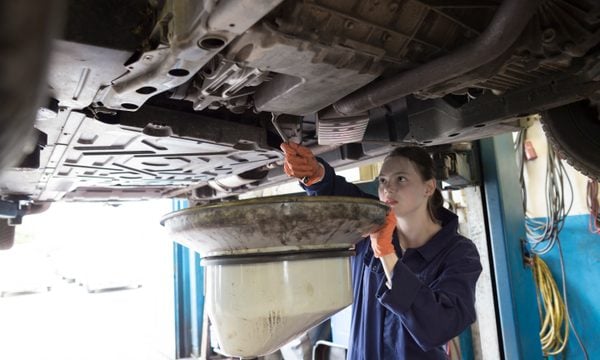When and How Often to Replace Your Tires
When the tread depth gets too low or your tires hit the six-year mark, it's time for new rubber.
Many, or all, of the products featured on this page are from our advertising partners who compensate us when you take certain actions on our website or click to take an action on their website. However, this does not influence our evaluations. Our opinions are our own. Here is a list of our partners and here's how we make money.
While the consensus across the auto industry is that you should consider replacing your tires at least every six years, there’s no magic number for how often you should replace them.
Tires become unsafe when tread becomes too thin, rubber is degraded by time and temperature or their sidewalls are damaged. A flat is an inconvenience, but a blowout or sketchy grip can lead to an accident.
Although tires can be a substantial expense for a car owner to handle at one time, wear and tear — and their replacement — is mostly predictable. Here’s a rundown of how to determine if your tires need to be replaced and common signs that your tires aren’t up to par.
Tread depth
Tires have grooves known as tread that help them grip the road. While most new tires have a tread depth around 10/32nds of an inch, the tread wears down over time. This makes it more difficult to steer your vehicle, reduces traction and increases braking time.
The U.S. Department of Transportation deems tires that have tread at or below 2/32nds of an inch to be unsafe. While your tire technically has enough tread to drive at this point, it can be dangerous to drive your car in certain conditions or for long distances.
There are three ways to figure out your tires’ tread depth:
- Tread wear indicators are built into tires and are raised, evenly spaced sections in the grooves of your tire tread. On new tires, they are not as high as the tread. However, when the tread reaches the same level as the indicators, it means it’s time to replace the tires.
- Tire tread gauges are relatively cheap tools that let you measure your tread in thirty-seconds of an inch. This will show you the exact measurement of your tire tread.
- The penny test lets you estimate tread depth based on where the tread hits a penny. To do this test, take a penny, turn it upside-down, and insert it straight down in the groove of a tire’s tread. Look straight on at the penny to determine where the tread hits President Lincoln’s profile. If you can see his entire head, you’ve hit the mark and need new tires.
Advertisement
Tire age
Regardless of how many miles they’ve driven, tires degrade over time and become more prone to failure. Factors like environmental conditions, storage and maintenance can influence how long a tire will last even if it’s only driven a few hundred miles a month.
While there’s no set requirement for when to replace tires according to age, the general recommendation is to replace them six years after the manufacture date and to never drive on tires that are older than 10 years.
» MORE: How much are tires?
Signs you might need new tires
Of course there are other times when your tires are telling you it’s time for replacement despite what your tread measurement might say.
You moved to a new climate. Some tires are designed for specific conditions such as extreme temperatures. Winter tires, for example, have deeper tread and are meant to be more flexible in cold weather; driving them on warm pavement can wear them down more quickly. If you move to a new climate, pay attention to road conditions and weather patterns to determine if you need different tires.
You’re losing traction. If it feels like your car is slipping or sliding during wet weather, this could be a sign of low tire tread that is failing to channel water away effectively. Because tire tread can wear unevenly, you might not notice that some of your tread has worn thin and is affecting your traction.
Most modern cars activate a warning light when your car loses traction. If you are seeing this warning light more frequently as time goes on, check the condition of your tires.
Your tires aren’t holding pressure like they should. Certain types of tire damage, including debris between the rim and the tire and damage to the sidewall, can cause continuous pressure loss. Some damage might be repairable, but some situations will call for new tires.
🤓 Nerdy Tip
An average of 2% air loss in tires is common for every drop of 10 degrees in outside temperature. So don’t worry if your tire pressure varies a bit when it starts to get colder outside.
Frequently Asked Questions
How long do tires last on average?
On average, tires last about six years or between 36,000-75,000 miles. But the actual lifespan of tires varies with factors like climate, maintenance and driving habits. No matter how they look, tires should never be used longer than 10 years.
When should I really replace my tires?
You should consider replacing your tires when the tread has worn down below the recommended depth of 2/32nds of an inch or they’re over six years old. You might also need to replace your tires if you notice changes in how your tires perform. Losing traction and constantly having to air them back up are common issues with worn out tires.
Should you replace all four tires at once?
If you drive an all-wheel drive vehicle, you’ll likely need to replace all four tires at the same time to avoid affecting the vehicle’s drivetrain. In other types of vehicles, you have more options. If you’re needing to replace a damaged tire and the other tires still have substantial tread and are in good shape, you can replace just the one tire. Talk with a tire specialist about the best way to go about replacing tires if you’re unsure.
How often should you replace tires if you don’t drive much?
All tires will start to deteriorate over time. Even if they have very little mileage on them, their tread will start to become thinner. So while you might get more than the average five to six years out of a tire, always replace tires before they hit their 10-year anniversaries regardless of how often you drive.
Article sources
NerdWallet writers are subject matter authorities who use primary,
trustworthy sources to inform their work, including peer-reviewed
studies, government websites, academic research and interviews with
industry experts. All content is fact-checked for accuracy, timeliness
and relevance. You can learn more about NerdWallet's high
standards for journalism by reading our
editorial guidelines.
More like this
Related articles
AD
Avoid Surprise Repair Bills in the Year Ahead. Get $300 Off Any Plan Today!
REDEEM NOW
on Endurance's website

AD

Avoid Surprise Repair Bills in the Year Ahead. Get $300 Off Any Plan Today!
- Choose Your Own Certified Mechanic;
- 30-day Money-Back Guarantee;
- Free 1 Year of Elite Benefits*;
- 24/7 Roadside Assistance & Rental Car Coverage.
REDEEM NOW
on Endurance's website
AD
Avoid Surprise Repair Bills in the Year Ahead. Get $300 Off Any Plan Today!
REDEEM NOW
on Endurance's website

AD

Avoid Surprise Repair Bills in the Year Ahead. Get $300 Off Any Plan Today!
- Choose Your Own Certified Mechanic;
- 30-day Money-Back Guarantee;
- Free 1 Year of Elite Benefits*;
- 24/7 Roadside Assistance & Rental Car Coverage.
REDEEM NOW
on Endurance's website
AD
Sign up now and get up to $360/year* off your plan!
REDEEM NOW
on CarShield's website
AD
Sign up now and get up to $360/year* off your plan!
- Prices Start as Low as $99/Month;
- Claims Paid Directly to the Repair Facility;
- 24/7 Roadside Assistance, Rental Cars & Towing;
- No long-term commitment. Cancel anytime.

REDEEM NOW
on CarShield's website









